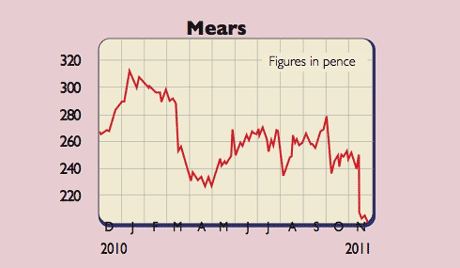Get the latest financial news, insights and expert analysis from our award-winning MoneyWeek team, to help you understand what really matters when it comes to your finances.
You are now subscribed
Your newsletter sign-up was successful
Want to add more newsletters?

Twice daily
MoneyWeek
Get the latest financial news, insights and expert analysis from our award-winning MoneyWeek team, to help you understand what really matters when it comes to your finances.

Four times a week
Look After My Bills
Sign up to our free money-saving newsletter, filled with the latest news and expert advice to help you find the best tips and deals for managing your bills. Start saving today!
Social housing and domiciliary care provider Mears Group reported a hefty £2.7bn order book, along with a £3bn order pipeline, in a trading statement last week. Of this sum, £1.6bn relates to contract awards within the next 12 months. This is equivalent to 95% of 2011 revenues and reflects the importance of its repairs arm (71% of sales). It maintains a UK portfolio of 500,000 houses owned by local authorities and housing associations. Work is carried out under long-term agreements to take care of all the little niggles in council rented properties. These include blocked drains, broken windows, detached tiles and broken-down boilers.
Performance in its domiciliary care division is also solid. It employs 7,000 carers, often women working flexible hours, who call on 20,000 residents requiring support. Clients are typically old and, in some cases, infirm. Mears' staff ensure that they are well fed and looked after. The firm competes with the likes of Allied Healthcare, Care UK, and Nestor Healthcare. Within the social housing sector its main rivals are Inspace, Kier, Lovells and Mitie.
In the first eight months of the year the group secured 47% and 62% by value (in housing and care respectively) of all the contracts tendered, amounting to a total order intake of £463m. Mears is also launching new services. Via its partnership with Tunstall it has already snaffled a blue-ribbon deal with Birmingham Council for the rollout of telecare/medicine across the city. In addition, it has begun selling an internally developed IT platform aimed at other care providers. Chief executive David Miles reckons this could transform administrative standards in the sector.
MoneyWeek
Subscribe to MoneyWeek today and get your first six magazine issues absolutely FREE

Sign up to Money Morning
Don't miss the latest investment and personal finances news, market analysis, plus money-saving tips with our free twice-daily newsletter
Don't miss the latest investment and personal finances news, market analysis, plus money-saving tips with our free twice-daily newsletter
Mears (LSE: MER), rated a BUY by Arbuthnot Securities

So why did the shares fall 13% after the trading update? The government recently announced steep cuts to its electricity feed-in tariffs, reducing them from 43p per KWH to 16.8p for multiple roof installations. This has made Mear's start-up solar installation unit (in partnership with British Gas) unviable. The resulting hit to operating profits was £2.8m for this year, along with another £2m in one-off charges. Miles stated: "While I still consider the group to be extremely well placed to benefit from the opportunities relating to fuel poverty, it is unfortunate that we have wasted time and resources in this area over the past six months." He demonstrated his confidence by buying 10,000 shares at 215p each.
Joint house broker Investec is now projecting 2011 turnover and underlying EPS of £585m and 23.8p respectively, rising to £634m and 28.3p in 2012. The shares thus trade on paltry price/earnings (p/e) ratios of less than nine, despite a strong balance sheet and a 3.1% dividend yield. I value the shares on a 13 times p/e multiple, or somewhere north of 300p.
Challenges include contract issues, delays and bureaucracy due to working with government bodies. But with local councils seeking to cut costs via outsourcers and the Bank of England aiming to stimulate the economy, I still think this is a good moment to jump on board. Investment bank Arbuthnot has a target price of 275p.
Rating: BUY at 210p (market capitalisation £185m)
Paul Hill also writes a weekly share-tipping newsletter, Precision Guided Investments. See www.moneyweek.com/PGI, or phone 020-7633 3634 for more.
Get the latest financial news, insights and expert analysis from our award-winning MoneyWeek team, to help you understand what really matters when it comes to your finances.
Paul gained a degree in electrical engineering and went on to qualify as a chartered management accountant. He has extensive corporate finance and investment experience and is a member of the Securities Institute.
Over the past 16 years Paul has held top-level financial management and M&A roles for blue-chip companies such as O2, GKN and Unilever. He is now director of his own capital investment and consultancy firm, PMH Capital Limited.
Paul is an expert at analysing companies in new, fast-growing markets, and is an extremely shrewd stock-picker.
-
 How a ‘great view’ from your home can boost its value by 35%
How a ‘great view’ from your home can boost its value by 35%A house that comes with a picturesque backdrop could add tens of thousands of pounds to its asking price – but how does each region compare?
-
 What is a care fees annuity and how much does it cost?
What is a care fees annuity and how much does it cost?How we will be cared for in our later years – and how much we are willing to pay for it – are conversations best had as early as possible. One option to cover the cost is a care fees annuity. We look at the pros and cons.